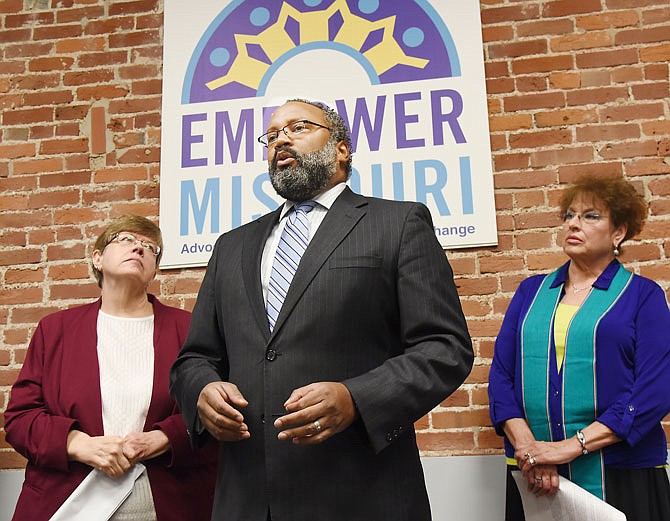Missourians need to keep working to correct problems lawmakers created this past year, representatives of several groups told reporters Friday.
"We commit ourselves to keep fighting for workers' rights because it's been a really terrible year for workers' rights here in our state," Empower Missouri Executive Director Jeanette Mott Oxford said.
That assault, said Jason Heyden, director of the state Legislative Board's SMART Transportation Division, includes "bills trying to take away prevailing wages, legislation taking away the rights for municipalities to set their own minimum wages - and the saddest one of all was when Gov. Greitens signed right to work into law earlier this year."
That law would prohibit any requirement that an employee join a union or pay fees to a union that represents that employee in negotiations with the employer.
However, Heyden and Mike Murphy of the Service Employees International Union noted that law is on hold until Missouri voters can either approve it or reject it - thanks to a petition drive that gathered more than 310,000 signatures throughout the state, when only 107,510 signatures were needed from six of the state's eight congressional districts to put the issue on next year's statewide ballot.
Murphy noted his group and others also are seeking petition signatures so voters can raise the state's minimum wage - now $7.70 an hour - to $12 an hour by 2023 and impose new limits on campaign donations and when a lawmaker can become a lobbyist.
"It's time to take power into our own hands and fix what's wrong in our state," Murphy told reporters at the Friday morning news conference. "We'll need a broad spectrum of allies to pass these ballot initiatives."
That's one reason his group is one of several sponsoring Empower Missouri's "Persisting and Organizing to Win" conference Oct. 5-6 in Clayton.
The Rev. Jeanie McGowan, a retired First Baptist Church pastor, said the state's minimum wage needs to be changed "because no one can live on the minimum wage with only one job. If the minimum wage had kept pace with economic growth and the cost of living, it would be well-over anything that we're even recommending now."
Mott Oxford reminded reporters people need to earn more than $15 an hour to afford a modest, two-bedroom apartment.
That October conference also will look at possible changes to a new discrimination law that went into effect Monday.
Rod Chapel, president of the Jefferson City and state NAACP groups, said: "We see this going hand-in-hand with the attack on working families. We believe that Missouri can do much better, that our moral fabric is much stronger - and that coming together will have a much better result for the people here in Missouri."
Leaders of the Republican-controlled Legislature said throughout the year they were elected to pass the kinds of law changes that occurred last spring.
But those attending Friday's news conference rejected that premise.
"That's actually not what President (Donald) Trump or Gov. (Eric) Greitens ran on," Mott Oxford said. "It wasn't about a conservative philosophy of 'let's hold wages down and let's eliminate Medicaid for people in nursing homes and little kids'" on state assistance.
Instead, she argued, both men ran as "outsiders" who promised to run government in a different way.
Speakers at Friday's news conference acknowledged many conservatives say government has grown too large and the work government does can be handled better by smaller organizations like churches.
But, McGowan noted, her church takes up a special collection once a month to help serve needy people and their families.
"People have been so incredibly generous," she said. "By Tuesday, most of that money is gone. The problem is so broad and widespread that it cannot just be managed by social groups, churches and so on."
Mott Oxford said the federal government provides about $20 in food assistance for each $1 generated by church groups.
Both women said government does many functions well.
Chapel, who directed Missouri's Labor and Industrial Relations Department a decade ago, noted one of government's services is providing oversight for safety of workers to allow them to be productive without getting injured.
"You don't throw the baby out with the bath water," McGowan noted.

